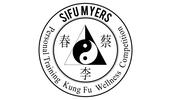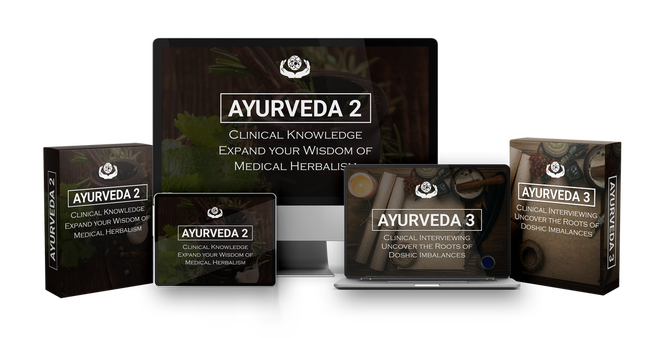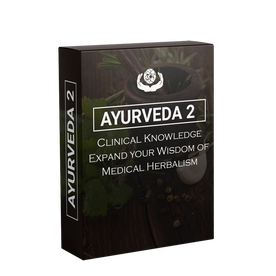
Ayurveda 2 - "Clinical Knowledge"; Expand your Wisdom of Medical Herbalism
Ayurveda is a system of medicine with thousands of years of literature. This course explores herbal treatment for conditions backed up by Ayurvedic Physicians and Research. It is geared towards expanding your knowledge base about what herbs are indicated for what conditions. Ayurveda is a deep and vast science. This course is a survey of clinical aspects. It is meant to be built off beginner level understanding (i.e. interplay between Doshas, understanding of Dhatus, Prakriti). This course is meant for those seeking deeper level understanding of herbal treatments. We will Cover:
- Ayurvedic Biology/Physiology so you can have an understanding of how to identify imbalances and target certain areas for re-balancing from an Ayurvedic perspective.
- Various types of diagnostic methods used in Ayurveda to enrich your repertoire of ways to determine what could be causing certain disturbances in the body and mind.
- Types of Ayurvedic medicinal preparations as well as principles in combining herbs to increase your knowledge of herbalism, building off of Ayurvedic Foundations Course.
- Peer-Reviewed scientific research into Ayurvedic treatments for serious disease conditions. This will help you build a knowledge base of proven results and increase your confidence in Ayurveda as a whole.
This is an intermediate course designed to give you the necessary foundations to take your studies to a more advanced level. It will give you a peak into types of treatments used by Ayurvedic physicians (Vaidyas). We will discuss the disease pathway according to Ayurveda which can provide a unique perspective as to how doshic imbalance can manifest as disease. This will also provide insight in how to correct the root cause of conditions, instead of just treating the symptoms.
Here is the exact lecture list:
1. Introduction
2. Who is this Course for?
3. Clinical Specialties of Ayurveda
4. Recommended Supplemental Books
5. Seat of Doshas
6. Vata Subdoshas
7. Pitta Subdoshas
8. Kapha Subdoshas
9. 13 Agnis
10. Tongue Diagnosis
11. Examining the Stool
12. Stages of Disease (Samprapti)
13. Carriers (Anupana)
14. Types of Ayurvedic Preparations
15. Shamana, Shodana, Rasayana
16. Brimhana & Lackshana Treatment
17. Virechana & Vomina
18. Principles of Combining Herbs
19. States of Agni
20. Signs & Treament of Ama
21. Heart
22. Insomnia/Anxiety
23. Asthma/Lung Health
24. Schizophrenia
25. Parkinsons
26. Multiple Sclerosis
27. Paralysis
28. Cancer
29. Skin
30. Arthritis
31. Reproductive Health
32. Thank You
Ayurveda has often been misunderstood in today’s popular culture as being an esoteric practice not based in fact. There is a reason, however, that the mother of all medical sciences has lasted this long. This course will provide that undeniable proof.
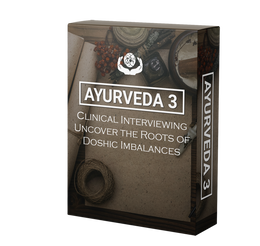
Ayurveda 3 - "Clinical Interviewing" - Uncover the Roots of Doshic Imbalances
Gathering information from your client is a critical step in formulating a treatment plan. It is necessary in order to uncover the root cause of the condition. A main cause of being effective as a natural wellness practitioner is correctly assessing the Rogi (patient) in order to develop a picture of what is going on. A healer's job is to first determine what is creating the imbalance and next to devise a protocol leading to health and balance. The end goal is always to heal or effectively manage the condition.
We will cover:
In this course we will go over a real life assessment and treatment plan. You will see first hand what factors were taken into consideration, and how plan was formed. I will provide a detailed look at what specific questions should be asked during an interview, and how to interpret their meaning. The goal is for you to pick up key elements leading to feeling confident in your intakes, assessments and treatment plans.
Included are the following lectures:
1. Introduction
2. What this Course is Not?
3. Prepping for an Interview
4. Interaction of Doshas
5. Stages of Disease 2
6. Interviewing Techniques 1
7. Interviewing Techniques 2
8. Interviewing Techniques 3
9. Interviewing Techniques 4
10. Bodily Observations
11. Interviewing about Diet
12. Interviewing about Mental Diet
13. Voice Assessment
14. Sleep Inquiry
15. Vikriti/Prakriti Assessment
16. Developing a Treatment Plan
17. Conclusion
The purpose here is to provide you a foundation for how an Ayurvedic assessment should be conducted. We will go over insights into conditions that are usually overlooked in modern-day clinical settings. Then you will build your knowledge on how to piece together and treat health conditions.
Gathering information from your client is a critical step in formulating a treatment plan. It is necessary in order to uncover the root cause of the condition. A main cause of being effective as a natural wellness practitioner is correctly assessing the Rogi (patient) in order to develop a picture of what is going on. A healer's job is to first determine what is creating the imbalance and next to devise a protocol leading to health and balance. The end goal is always to heal or effectively manage the condition.
We will cover:
- How to properly interview a rogi (patient) which is an important part of gathering information to determine what treatment protocols to use.
- Techniques for gathering knowledge about potential imbalances. This will allow you to look deeper into the situation which is wisdom beyond the conventional diagnostic method.
- A real treatment protocol, so you can gain insight into how to write up an assessment based off the information you gather. This is practical information that can be invaluable in your current or future practice.
In this course we will go over a real life assessment and treatment plan. You will see first hand what factors were taken into consideration, and how plan was formed. I will provide a detailed look at what specific questions should be asked during an interview, and how to interpret their meaning. The goal is for you to pick up key elements leading to feeling confident in your intakes, assessments and treatment plans.
Included are the following lectures:
1. Introduction
2. What this Course is Not?
3. Prepping for an Interview
4. Interaction of Doshas
5. Stages of Disease 2
6. Interviewing Techniques 1
7. Interviewing Techniques 2
8. Interviewing Techniques 3
9. Interviewing Techniques 4
10. Bodily Observations
11. Interviewing about Diet
12. Interviewing about Mental Diet
13. Voice Assessment
14. Sleep Inquiry
15. Vikriti/Prakriti Assessment
16. Developing a Treatment Plan
17. Conclusion
The purpose here is to provide you a foundation for how an Ayurvedic assessment should be conducted. We will go over insights into conditions that are usually overlooked in modern-day clinical settings. Then you will build your knowledge on how to piece together and treat health conditions.
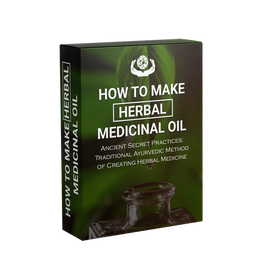
How to Make Herbal Medicinal Oil
Ancient Secret Practices: Traditional Ayurvedic Method of Creating Herbal Medicine
Welcome to the “How to Make Medicinal Herbal Oil” course! Have you ever wanted to create your own herbal medicines? Are you an aspiring or experienced herbalist who wants to be able to transfer your unique blends into oil form? Maybe you would like to create your own massage oil, hair oil or internal oil. The possibilities are endless!
Herbal oil has been around for thousands of years. It has been used as a key medicine in treating loads of various conditions and also for general well-being. In this course I will teach you the traditional Ayurvedic way of creating medicinal oil. You can do this from the comfort of your own home. You don’t need any special machines, but rather standard kitchen items.
Medicinal oil has a multitude of uses from helping to manage digestion, neurological issues, skin, hair, relaxation, and more. The standard way of producing these oils is the same, however. This course in an excellent starting ground for understanding how to create herbal oils safely and effectively.
You will learn:
Ancient Secret Practices: Traditional Ayurvedic Method of Creating Herbal Medicine
Welcome to the “How to Make Medicinal Herbal Oil” course! Have you ever wanted to create your own herbal medicines? Are you an aspiring or experienced herbalist who wants to be able to transfer your unique blends into oil form? Maybe you would like to create your own massage oil, hair oil or internal oil. The possibilities are endless!
Herbal oil has been around for thousands of years. It has been used as a key medicine in treating loads of various conditions and also for general well-being. In this course I will teach you the traditional Ayurvedic way of creating medicinal oil. You can do this from the comfort of your own home. You don’t need any special machines, but rather standard kitchen items.
Medicinal oil has a multitude of uses from helping to manage digestion, neurological issues, skin, hair, relaxation, and more. The standard way of producing these oils is the same, however. This course in an excellent starting ground for understanding how to create herbal oils safely and effectively.
You will learn:
- How to gather the appropriate items needed to create your medicinal oil
- How to appropriately assess the quantities of herbs based off their consistency
- How to make oil decoctions without destroying the herbal properties
- How to measure and determine the ratios of oil & herbs
- How to bottle your formulation
Course Preview
Introduction - Ayurveda 2
Who Should Take This Course
Clinical Specialties of Ayurveda
Introduction - Ayurveda 3
What this Course is Not
Reviews
"Really good content …"
-Purva S.
"Great teacher, courses. Good in-depth information though each course. I really enjoyed this triple course and look forward to seeking another course of Max's. Thank you, Blessed Be. = )"
-Joanne J.
"High Class of Ayurvedic Medicine Knowledge, and the practicals make it easy to understand, and applicable for all uses. Highly recommended for all interested."
-Andrew Ephraim A.
"i took the first double course this was just as great thank you"
-Vanessa M N.
"Love the breakdown of all the different symptoms and treatments!!!1"
-Carla L M.
"All excellent"
-Cathy A.
"So far so good ccccccccccccccc"
-Aleia A.
"Teacher is knowledgeable and easy to follow."
-Tracie D.
"happy"
-Jannion H.
-Purva S.
"Great teacher, courses. Good in-depth information though each course. I really enjoyed this triple course and look forward to seeking another course of Max's. Thank you, Blessed Be. = )"
-Joanne J.
"High Class of Ayurvedic Medicine Knowledge, and the practicals make it easy to understand, and applicable for all uses. Highly recommended for all interested."
-Andrew Ephraim A.
"i took the first double course this was just as great thank you"
-Vanessa M N.
"Love the breakdown of all the different symptoms and treatments!!!1"
-Carla L M.
"All excellent"
-Cathy A.
"So far so good ccccccccccccccc"
-Aleia A.
"Teacher is knowledgeable and easy to follow."
-Tracie D.
"happy"
-Jannion H.
Cancel Anytime!
Please correct the highlighted fields.
Copyright © 2020 - Sifu Myers - All Rights Reserved
Home | Disclaimer | Privacy Policy | Reviews | Contact
Home | Disclaimer | Privacy Policy | Reviews | Contact
